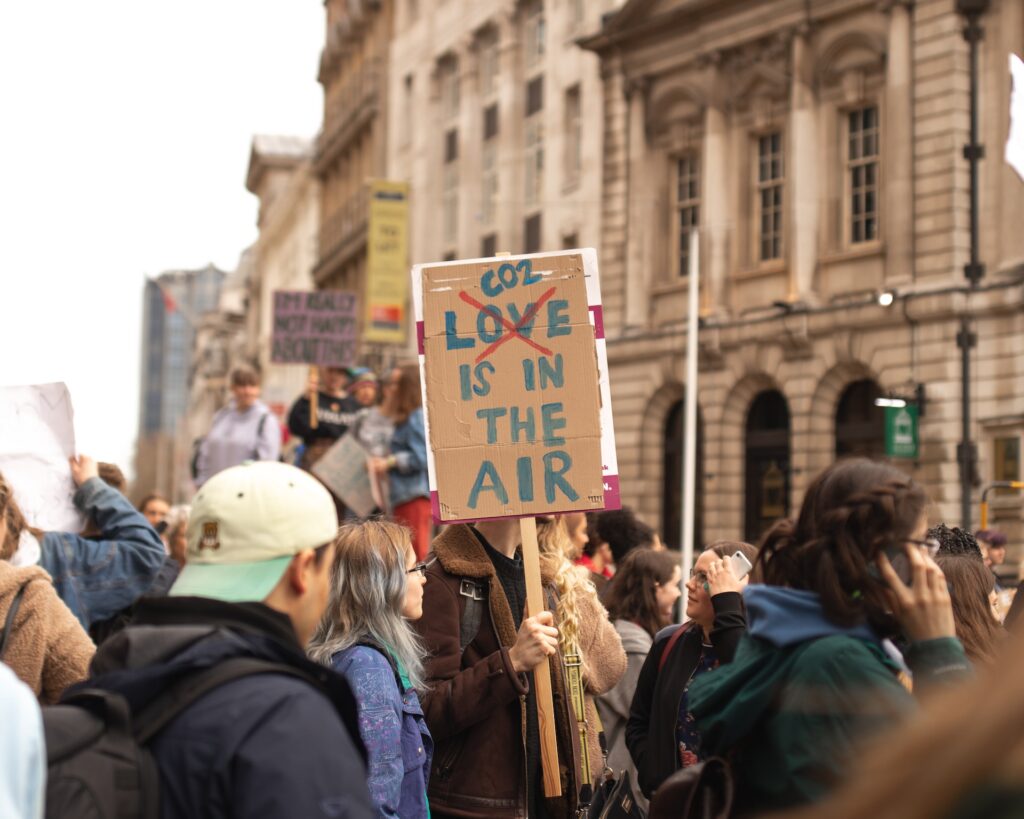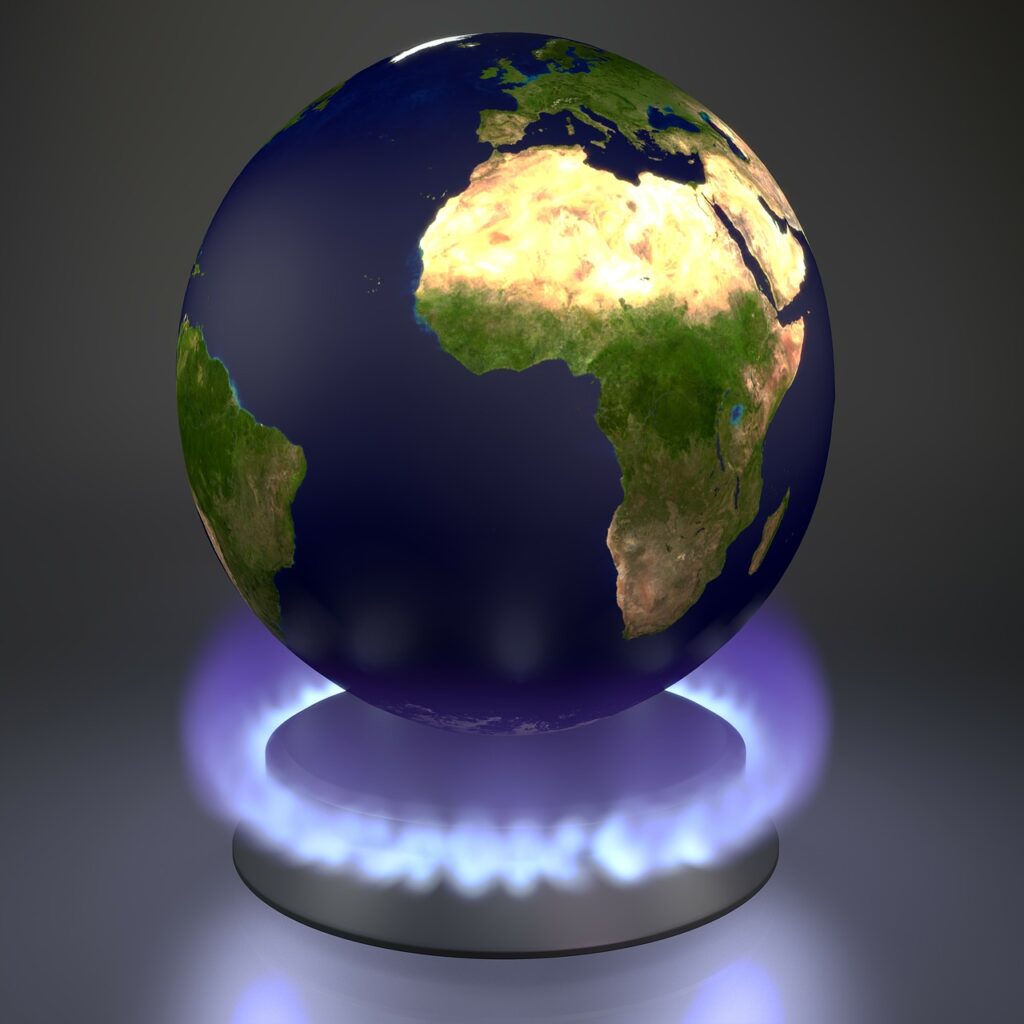- What is Global Warming?
- What are the causes of global warming?
- What are the effects of global warming?
- 6 high risks of global warming
- The UK’s stance on global warming
- The UK’s contributions to global warming
- UKs climate target
- How UK deals with global warming in the future
- How individuals can contribute towards global warming
- Conclusion
What is Global Warming?
Global warming refers to the gradual increase in the Earth’s temperature due to the accumulation of greenhouse gases, such as carbon dioxide and methane, in the atmosphere. These gases trap heat from the sun that would otherwise escape back into space, causing a rise in global temperatures.
The primary cause of global warming is human activities such as burning fossil fuels like coal, oil and gas for transportation and energy production. Deforestation and industrial processes also contribute significantly to emissions.

The effects of global warming are widespread and catastrophic. Rising sea levels have led to increased flooding of coastal areas while extreme weather events such as hurricanes or droughts have become more frequent.
To prevent further damage caused by global warming, we must reduce our greenhouse gas emissions drastically. Solutions include transitioning towards renewable energy sources like wind or solar power, reducing waste through recycling programs, promoting sustainable agriculture practices etc.
It is essential that we all take action together to combat this crisis before it’s too late!
What are the causes of global warming?
Global warming is a complex issue that has been caused by various factors. One of the primary causes of global warming is human activities, such as burning fossil fuels for energy and transportation. When we burn coal, oil, and gas to generate electricity or power our cars, carbon dioxide (CO2) and other greenhouse gases are released into the atmosphere.

Another significant cause of global warming is deforestation. Trees absorb CO2 from the atmosphere during photosynthesis; without them, more CO2 accumulates in the air. Deforestation also reduces biodiversity and disrupts ecosystems.
Agriculture is another contributor to global warming. The use of fertilizers releases nitrous oxide (N2O), a potent greenhouse gas that can stay in the atmosphere for over 100 years. Livestock farming also produces methane (CH4), which has an even greater warming effect than CO2.
Natural processes like volcanic eruptions and changes in solar radiation levels can impact global temperatures but have much less influence compared to human activity.
It’s clear that humans play a crucial role in causing climate change through their daily activities such as driving cars or consuming meat products since these actions produce significant amounts of greenhouse gases leading to temperature increases worldwide.
What are the effects of global warming?
The effects of global warming are wide-ranging and can be catastrophic. One of the most significant impacts is the rise in sea levels caused by melting glaciers and ice caps. This increase in sea levels puts low-lying areas at risk of flooding, which can displace entire populations.
Global warming also causes changes in weather patterns, leading to more frequent and severe natural disasters such as hurricanes, floods, droughts, and wildfires. These events can result in the loss of lives, homes, crops, livestock, and infrastructure.
Another impact of global warming is on wildlife and ecosystems. Rising temperatures cause habitats to shift or disappear altogether. Many species cannot adapt fast enough to these changes resulting in extinction or endangerment.
Furthermore, increased carbon dioxide levels from burning fossil fuels have led to ocean acidification which negatively affects marine life including shellfish and coral reefs.
Finally yet importantly global warming has a direct effect on our health since it contributes to air pollution that triggers respiratory illnesses like asthma or bronchitis among other issues.
It’s clear that global warming has far-reaching consequences that affect not only nature but human beings too. It’s time for us all to take action towards lowering our carbon footprint!
6 high risks of global warming
1. Rising Temperatures and Heatwaves: One of the most apparent effects of global warming is the overall increase in temperatures worldwide. Rising temperatures contribute to more frequent and intense heatwaves, which can have severe implications for human health. Heat-related illnesses, such as heatstroke and dehydration, become more prevalent, particularly among vulnerable populations like the elderly and children.
2. Extreme Weather Events: Global warming has been linked to an increase in extreme weather events. Hurricanes, typhoons, cyclones, and intense rainfall are becoming more frequent and severe. These events lead to devastating floods, landslides, and property damage, causing the displacement of communities and loss of lives. Moreover, the occurrence of droughts and wildfires is also on the rise, threatening ecosystems, agriculture, and water resources.
3. Sea-Level Rise and Coastal Erosion: As global temperatures continue to rise, the melting of polar ice caps and glaciers accelerates, resulting in a rise in sea levels. Higher sea levels, combined with increased storm surges, pose a significant risk to coastal regions, small island nations, and low-lying areas. This could lead to the loss of land, increased coastal erosion, and the displacement of millions of people living in these vulnerable areas.
4. Ecosystem Disruption and Biodiversity Loss: The Earth’s ecosystems are intricately balanced, and global warming disrupts this delicate equilibrium. Many species are facing unprecedented challenges as their habitats change rapidly or become uninhabitable. Coral reefs, for instance, are highly vulnerable to warmer ocean temperatures, leading to widespread bleaching and degradation. Biodiversity loss threatens the stability of ecosystems, the extinction of species, and potential disruptions to food chains, affecting human livelihoods and well-being.
5. Agricultural Impacts and Food Security: Agriculture is heavily reliant on stable climate conditions, including temperature, precipitation, and predictable growing seasons. Global warming disrupts these conditions, leading to reduced crop yields, changes in pest and disease patterns, and shifts in suitable agricultural regions. The resulting impacts on global food production pose a significant threat to food security, potentially exacerbating hunger, and malnutrition, particularly in developing countries.
6. Health Risks and Disease Spread: Changes in temperature and precipitation patterns can influence the spread of diseases. Warmer climates create favourable conditions for disease vectors like mosquitoes, leading to the expansion of vector-borne illnesses such as malaria, dengue fever, and Zika virus. Additionally, increased air pollution, associated with global warming, can exacerbate respiratory problems, and contribute to higher rates of respiratory illnesses.
The UK’s stance on global warming
The UK has been taking steps to address global warming in recent years, recognizing the importance of reducing greenhouse gas emissions and transitioning to a low-carbon economy. In fact, it was the first country in the world to legislate for net-zero emissions by 2050.
The government has implemented several policies aimed at reducing emissions from various sectors such as transport, industry and energy production. For instance, they have introduced measures like electric car incentives and energy efficiency programs for homes and businesses.

Furthermore, the UK is committed to international efforts aimed at tackling climate change. The country played a key role in negotiating the Paris Agreement on Climate Change which aims to keep global temperature rise below 2°C above pre-industrial levels.
However, critics argue that more needs to be done by the UK government if they are serious about achieving their targets. There are concerns that some policies lack ambition or funding needed for success. Nonetheless, there is no doubt that the UK’s stance on global warming demonstrates its commitment towards saving our planet for future generations.
The UK’s contributions to global warming
The UK has been a leader in efforts to reduce global warming. The country has set ambitious targets for reducing greenhouse gas emissions, with the goal of achieving net-zero emissions by 2050. This means that all carbon emissions will be offset by measures such as planting trees or using technology to capture and store carbon dioxide.
To achieve this target, the UK government is taking several steps. First, it is investing heavily in renewable energy sources like wind and solar power. These sources of energy are much cleaner than traditional fossil fuels like coal and oil.
Secondly, the government is working to improve energy efficiency across industries. Buildings account for a significant portion of carbon emissions, so improving insulation and heating systems can make a big difference.
The UK is promoting low-carbon transportation options like electric cars and public transport. By making these options more affordable and accessible, fewer people will need to rely on polluting vehicles.
The UK’s plans to reduce global warming are comprehensive and robust. With continued investment in renewable energies and improvements in efficiency across industries, there is hope that we can save our planet from further damage caused by climate change.
UKs climate target
The UK has set ambitious climate targets in an effort to tackle global warming. In 2019, the government passed legislation requiring the country to reach net-zero greenhouse gas emissions by 2050. This means that any remaining emissions must be balanced out by removing an equivalent amount from the atmosphere.
To achieve this goal, the UK plans to reduce its emissions across all sectors of society and economy including transport, energy generation, agriculture, and industry. The government is investing billions in renewable energy projects such as offshore wind farms and electric vehicle infrastructure.
The UK also aims to phase out coal power plants completely by 2024 and ban sales of new gasoline and diesel cars by 2030. Additionally, funding for research into low-carbon technologies will be increased.
While these targets are certainly ambitious, many experts believe that they may not go far enough in preventing catastrophic climate change. However, they do show a strong commitment on behalf of the UK towards combating global warming and leading other nations towards a more sustainable future.
How UK deals with global warming in the future
The future of the UK and climate change is an issue that concerns both policymakers and citizens alike. With the threat of global warming becoming more pressing by the day, it’s important for countries like the UK to take action in order to mitigate its effects.
One way that the UK is preparing for a global warming is by investing in renewable energy sources. The country has set ambitious targets for reducing greenhouse gas emissions, with plans to phase out coal power plants and increase wind and solar capacity.
Another aspect of the UK’s approach to global warming involves increasing public awareness about environmental issues. Education campaigns are being implemented across schools and communities, stressing the importance of responsible consumption habits such as recycling or reducing plastic waste.
However, there are still challenges ahead. As a developed nation with high levels of consumption, it will require significant effort from all sectors to reduce emissions effectively while maintaining economic growth.
It seems clear that addressing climate change will continue to be a priority in the coming years for both individuals and governments alike – only together can we hope to save our planet for future generations.
How individuals can contribute towards global warming
Individuals can play a crucial role in reducing emissions and fighting against global warming. One of the most effective ways to reduce your carbon footprint is to use public transportation, carpool, or bike instead of driving alone. This will not only save fuel but also reduce traffic congestion.
Another great way to help tackle global warming is by eating less meat and dairy products. The production of meat and dairy requires a lot of energy, land, water, and feed which contribute significantly to greenhouse gas emissions. You can start by incorporating more plant-based foods into your diet such as fruits, vegetables, nuts, seeds, grains, and legumes.

Reducing energy consumption at home is another important step towards reducing emissions. Simple actions like turning off lights when leaving a room or switching off electronic devices when not in use can make a big difference over time. Also, you can switch to renewable sources like solar panels or wind turbines if possible.
Finally, it is important for individuals to consume wisely because everything we buy has an impact on the environment including packaging materials that are often single-use plastic items. Minimizing waste through recycling efforts along with purchasing environmentally-friendly products made from sustainable materials helps ensure we are doing our part in the fight against global warming
Conclusion
To sum up, it is clear that global warming is one of the most pressing issues we face today. The UK has taken some positive steps towards reducing emissions and combating climate change through its ambitious climate targets and policies aimed at reducing carbon footprint.
However, there is still much work to be done if we are going to truly save our planet from the devastating effects of global warming. It is essential that individuals take responsibility for their actions by making small changes in their daily lives such as using public transport or cycling instead of driving, reducing meat consumption, and switching to renewable energy sources.
Ultimately, it is up to all of us – governments, businesses, and individuals alike – to come together in a cohesive effort to tackle this issue. By working together, we can make a real difference in preserving our planet for generations to come. Let us act now before it’s too late!


[…] the waste disposal, huge amounts of wastes combust to form greenhouse gases which leads to global warming and climate […]
[…] the choice to choose sustainable products over regular products play a vital role in tackling global warming and they are also earth friendly. Some key changes that takes place when we choose eco friendly […]